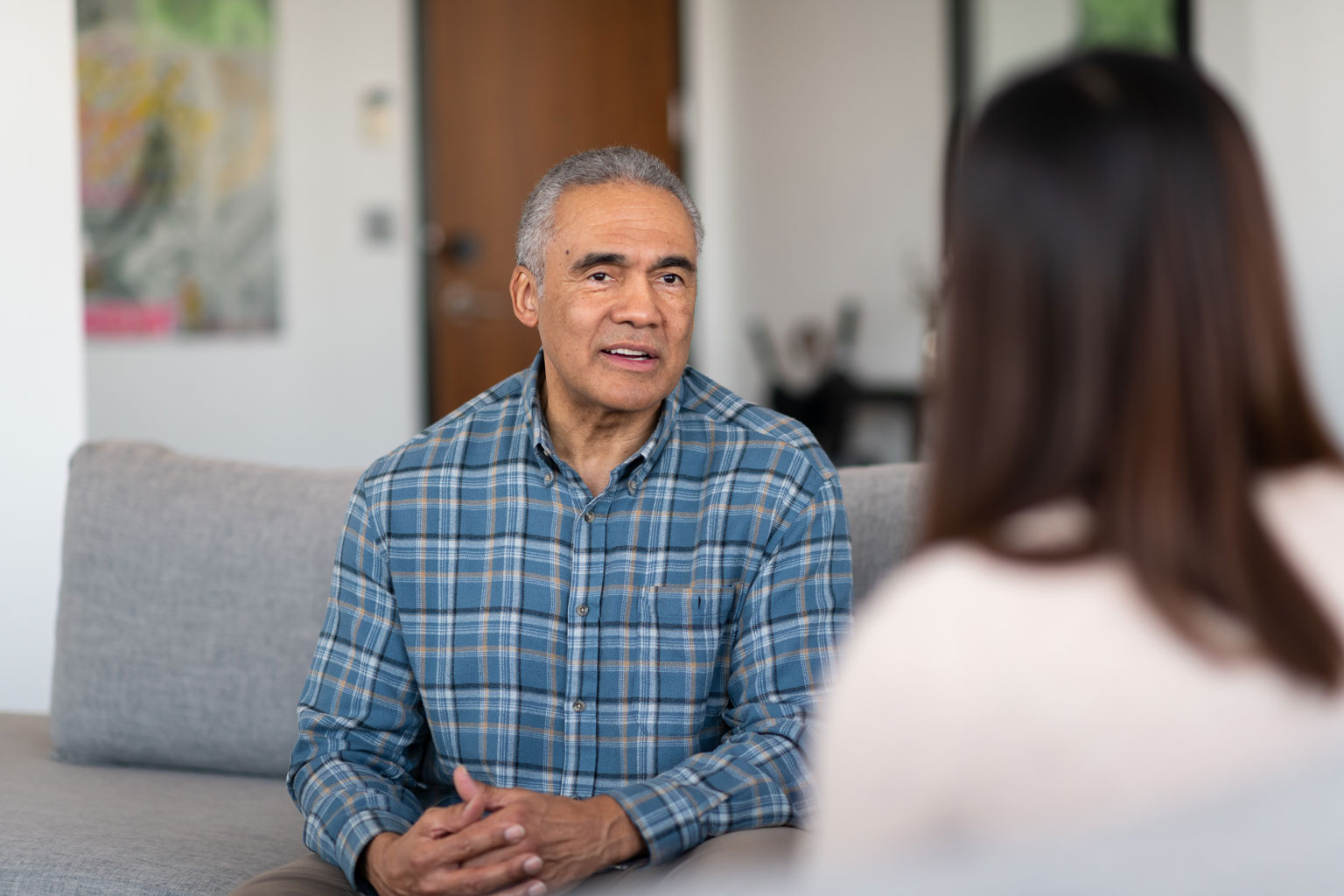What is Geriatric Depression Treatment?
Geriatric depression is a bigger problem than many people realize, and geriatric depression is on the rise.
What Is Geriatric Depression?
Geriatric depression is a mental health condition that affects older adults. It’s normal to go through rough patches while aging, but clinical depression in elderly people is not a normal part of aging. Studies show that many older adults feel mostly content with their lives, even if they have more health issues than younger people.1 Despite the fact that many older people are satisfied in life as well, geriatric depression is a serious problem, affecting up to seven million adults in the United States each year.2
There is no definitive cause for geriatric depression, but it is thought to be caused by a combination of factors; these factors will be detailed below.

Genetics
People who have a family history of depression are at an increased risk to experience geriatric depression. Additionally, women are twice as likely to experience geriatric depression.
Brain Chemistry and Brain Structure
Medical Conditions
People who have certain diseases and illnesses, like diabetes, cancer, heart disease, and chronic pain are more likely to experience depression.
Stress
Losing a loved one, going through a divorce, dealing with an illness, or having a lack of support in old age can all increase a person’s likelihood of experiencing depression.
Substance Use
Having a history of substance abuse can make depression more likely due to the way the brain can change as a result of substance use. The use of certain medications, like benzodiazepines, stimulants, beta-blockers, and corticosteroids are also associated with depression.
Signs and Symptoms of Geriatric Depression
Older adults who experience geriatric depression may experience a loss of interest in things they once found enjoyable, as well as feelings of sadness or emptiness. Other elderly depression signs can include:
- Fatigue
- Sleep changes
- Irritability
- Body aches and pains
- Apathy
- Crying
- Inability to focus
- Withdrawal or social isolation
- Changes in appetite
- Thoughts of suicide
If you or someone you know is having suicidal thoughts, don’t hesitate to reach out to your doctor for geriatric depression treatment or contact the mental health lifeline at 988.
What Problems Affect Treatment of Depression in Older Adults?
When it comes to treating depression in elderly communities, there are some complications that can come up. For instance, a symptom of geriatric depression is bodily aches and pains, but someone who is in their older years may have aches and pains for other reasons. Older people also may not exhibit typical expressions of depression like sadness or feelings of emptiness. Instead, they may be irritable, have changes in sleep patterns or insomnia, feel confused, and move more slowly than usual.4
Additionally, treatment in the form of elderly depression medication may be difficult if an individual takes other medications, as it is important that a potential antidepressant prescription does not interact with any other medications.
Principles of Treatment for Elderly Patients
It is important to think about the individual in need and their specific symptoms when it comes to treating depression in older adults. Insomnia is a common predictor of geriatric depression, and insomnia is a condition often treated with benzodiazepines like Xanax and Valium. However, benzodiazepines may not be the best choice for older adults, as these medications can increase the risk for falls and respiratory depression while also decreasing alertness. Melatonin is a common alternative.
When it comes to antidepressants, there is no one best antidepressant for elderly people. Research shows that while antidepressants can help older people, they may not be as effective as they are for young people. Ultimately, the best antidepressant for elderly people is highly individual, but it is likely to be one that does not have side effects of sedation or confusion. Below, we will explain more about the best antidepressant for geriatric patients and more information about treating depression in elderly adults.
Treatment Options Available for Geriatric Depression
Geriatric depression treatment is similar to depression treatment for people of all ages and usually involves therapy, medication, or a combination of the two. Specific types of therapy may be more effective for older adults, including:
Interpersonal Psychotherapy
This type of therapy has been proven to help in treating depression in elderly people. It can be particularly useful when the depression stems from grief or from lacking a community.
Reminiscence Therapy
Reminiscence therapy focuses on the senses—sight, smell, taste, touch, and sound—to help individuals reconnect with memories. This is a useful geriatric depression treatment and is good for older adults who may have dementia or memory issues.
Electroconvulsive Therapy
Because antidepressant medications don’t always work for depressed seniors, electroconvulsive therapy (ECT) is a non-invasive and effective treatment option. It is generally safe, but not recommended for people with cognitive impairments.
Support Groups
Support groups not only offer treatment for the elderly, but they may also give older adults the opportunity to meet new people and foster a sense of community, which can improve mood and wellbeing.
Medications
Aside from therapy, there are several medications that can also be used for depression in the elderly. Antidepressants for the elderly include:
- Selective serotonin reuptake inhibitors (SSRIs)
- Selective serotonin-norepinephrine reuptake inhibitors (SNRIs)
- Tricyclic antidepressants
- Monoamine oxidase inhibitors
- Bupropion
- Mirtazapine
There are many options when it comes to choosing the best antidepressant for the elderly, but it is important to keep in mind that the best antidepressant for geriatric patients is highly individual, and the safest antidepressant for the elderly can only be determined by an individual’s doctor.
Self-Help for Elderly Depression
Whether you are the one struggling or you are trying to figure out how to help someone else with depression, there are some important tips to consider. While the best treatment for depression in the elderly may be a combination of medication and therapy, there are some self-care tips that can be done at home to improve symptoms of depression. Some self-help tips include:
Writing Down Your Memories
Recalling memories from earlier in life can give you the opportunity to reflect on the different people you’ve been close to and the joyful times you’ve had in life.
Taking Care of a Pet
Depression sometimes comes with feeling a lack of purpose or boredom. When you have a pet to look after, it can restore that sense of purpose and routine into your life and provide you with a loyal companion.
Joining a Support Group
Finding people who understand what you’re experiencing can be extremely therapeutic and help you to feel less alone.
Creating Opportunities to Laugh
Getting Involved in Your Community
Having a sense of community can be great for mental health. By getting involved in your community by volunteering, going to church, or attending community events, you can connect with others and fill your days with purpose.
Other tips include traveling, spending time in nature, and being sure to eat healthily and exercise regularly to support good mental and physical health.
Get Professional Help for Geriatric Depression at Essence Healthcare
Essence Healthcare recognizes that geriatric depression treatment is highly dependent on each individual’s needs. That’s why we offer a variety of services at all levels of care. At Essence Healthcare, you can receive effective therapies such as:
- Cognitive behavioral therapy
- Dialectical behavioral therapy
- Eye movement desensitization and reprocessing (EMDR)
- Dual diagnosis treatment
When depression is severe, sometimes inpatient or residential treatment is a good option for treating depression. Inpatient treatment allows for the intensive support you may need to feel better, along with fun activities like family dinners to keep recovery as enjoyable as possible. However, outpatient treatment can also be a great resource for geriatric depression, as it still offers intensive support but on your schedule.

Opportunities for Long Lasting Wellness
We also offer aftercare programs, so you know you’re never alone in dealing with depression, even after you have completed treatment. If you or your loved one struggles with depression, know you have many options available to you to help you feel better. Contact us today to find out more.


